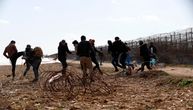Tensions between villagers and migrants in Sid: "They break into our houses. Everything scares us."
Two parallel worlds, side by side. Fear, mistrust, anxiety...
"Lock the door. Watch for any noise. If the dog barks, you may be in danger. Don't leave the children alone at home... Older people, be especially aware. They don't hesitate to empty your entire fridge, drink all your drinks, break the windows and leave wreckage, soot behind."
This is how the town of Sid murmurs - the last railway station in Serbia and the fourth major European obstacle on the migrant route from Turkey to promised land Germany. Locals watch them walk through the streets, fields, forests. And when they don't cause damage to anyone, everything works according to some kind of unwritten principle, "I don't bother you, don't bother me."
These are two parallel worlds, side by side. Fear, mistrust, anxiety have crept into the peaceful villages of the Srem region and the weekend homes on the gentle slopes of Mt. Fruska Gora and the gateway to Semberija.
Our crew spent a day with residents of Sid and their uninvited guests, with whom they share the same sky and the same air, in a tense atmosphere calmed by an ever increasing number of police officers.
"Children are not allowed to go outside unaccompanied. Until now we've somehow tolerated everything, they (migrants) were peaceful, but now things have become critical, they started arguing and fighting amongst themselves. They went into the house of my neighbor, who has two young children, while the children were alone," says Dragana Stanivukovic as she pushes a baby stroller.
She says the situation has, however, become easier since police patrols have been stepped up.
In recent days, migrants have mostly been accommodated in shelters, so people have felt relief, but dark-skinned paperless passengers are constantly arriving... They travel by train or walk along the railroad, even walking in columns along the highway. They reach the European "ramp" - Sid, or Tovarnik across the border. It will take months, perhaps a whole year, for some of them to reach the Croatian side without running into ambush there and being pushed back to Serbia.
As we passed through a neighborhood located next to the train station, which was the first to be hit by burglars in recent months, we came acros a police patrol that had stopped a group of migrants at that very moment. A police van arrived. They were headed straight to - the reception center.
The centers are quiet. Migrants, including women and children, sit quietly in the spring sun, talking, posing for a photo.
"I'm 19 and I come from Iran. I've been here a year and 8 months. I tried to enter Croatia eight times by train, twice by truck, twice on foot and once from Bosnia. I had no success," one of the young men staying at the reception center near the train station tells us.
He says he isn't aware that houses are being broken into...
"I wonder why the police won't let us go outside after 10 in the evening. For example, on a Saturday night, we want to go out, have a drink, eat something," he says.
One Iraqi man said he is dissatisfied with the treatment, as families are allegedly being separated when they are returned to the camps.
"We are merely refugees and we are registered in Serbia. They punish us every day. They separate families, which is not right. We live in bad conditions," he said.
But, in Sid, people lock their gates and the fear has crept in.
"They light fires here at night. Man, you have to yell, make a noise, what am I gonna do, fight with them? They rip off planks from my barn to light a fire. I go out at night or look through the porch, yell, shout, call the police. There (he points across the street) they found three men lying in bed in broad daylight! This man was watching the house, when he got in, they had broken a window, went inside. When they see the police, they run across the railroad," says Damjan Kurbalija.
His neighbor, Stanko Maric, says that for a while migrants slept in a park across the street from his home.
"And they look at your house, they know when you're out. How can I leave it? Two houses have been broken into," says Stanko Maric.
We pass by one ruin. Graffiti in Arabic are written on the walls. And there's one cartoon drawing of a migrant showing his middle finger to the police.
"Many speak well of them - until their house gets burgled, well, then there's a problem" one passerby tells us.
The situation in Sid, however, does not look extraordinary. It's completely peaceful in the center of the municipality - we saw neither any migrants nor the police. Still, there is a problem that keeps simmering, flaring up at night when footsteps are heard in front of homes.
"They burst into my house I was with my kids. Don't ask me anything, I went after them with a rolling pin. I'm not allowed to say anything because of the police," a woman spoke anonymously.
Many in Sid, although they have seen migrants, have not had any problems with them.
"We see that they pass in the evening, they go, those who cross (the border), cross, those who don't return in the morning. What I do know is I was a refugee myself, so in a way I understand all that, but I don't understand if they break into someone's home, when there's burglary... They broke into some houses in Vasica, but they didn't make much (damage), those are mostly abandoned houses. I'm not afraid, when they go down the street carrying empty bottles, I give them water. I hear, some people have had problems, I haven't," says one local.
We also visited the border zones - the village of Berkasovo, which is located along the border with Croatia, where some weekend homes have been broken into. Some remained open, some have been padlocked. There have been break-ins and burglaries in Batrovci, the last place as you leave Serbia traveling on the highway.
It's calm now. We found only one man in the center of the village - Sinisa Valjevac.
"They aren't here at the moment because the police were about. They walk down the street, mostly at night. It was peaceful until they came, we kept our cars outside, we didn't lock up, we slept where we wanted, and this now... keep your car in the yard, keep a big dog and so on, lock up. As soon as a thump is heard, you go out to see what it is. We talk to them sometimes, they come here, one raised his shirt to show us how the Croats beat him on the back. One migrant was bruised. As for Serbia they say only 'good', as in, we're good," Sinisa tells us in front of a village store.
Harsh words are also heard. Stories are told of migrants bursting into stores, one worker showed us a stick she uses to defend herself.
After all, there are major cultural differences and a completely different position of the locals and the migrants. Ones get by, guarding waht little they have, while the others, who have nothing, rush on without looking much behind.
(Mateja Beljan)

